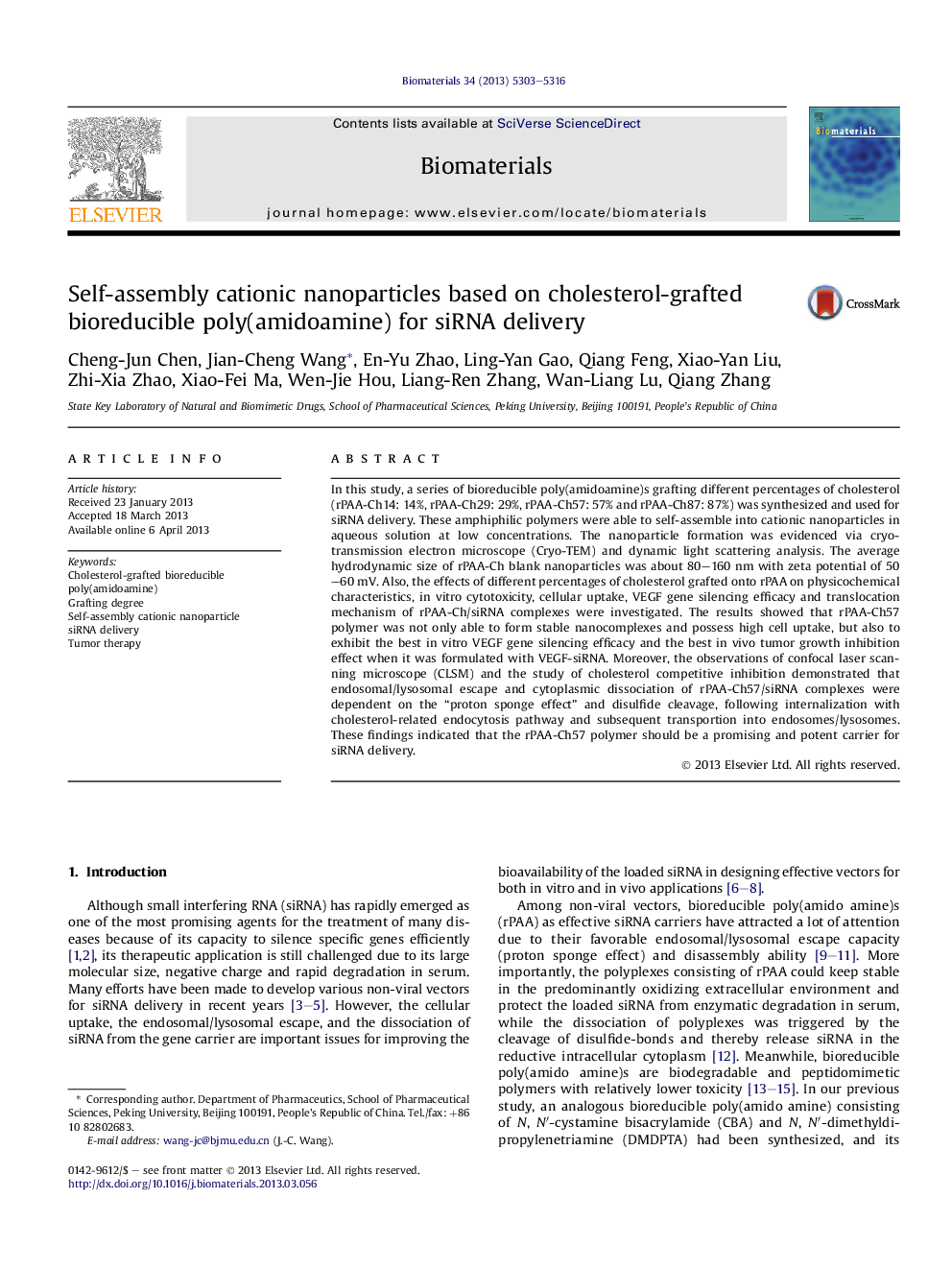| کد مقاله | کد نشریه | سال انتشار | مقاله انگلیسی | نسخه تمام متن |
|---|---|---|---|---|
| 10229031 | 503 | 2013 | 14 صفحه PDF | دانلود رایگان |
عنوان انگلیسی مقاله ISI
Self-assembly cationic nanoparticles based on cholesterol-grafted bioreducible poly(amidoamine) for siRNA delivery
دانلود مقاله + سفارش ترجمه
دانلود مقاله ISI انگلیسی
رایگان برای ایرانیان
موضوعات مرتبط
مهندسی و علوم پایه
مهندسی شیمی
بیو مهندسی (مهندسی زیستی)
پیش نمایش صفحه اول مقاله

چکیده انگلیسی
In this study, a series of bioreducible poly(amidoamine)s grafting different percentages of cholesterol (rPAA-Ch14: 14%, rPAA-Ch29: 29%, rPAA-Ch57: 57% and rPAA-Ch87: 87%) was synthesized and used for siRNA delivery. These amphiphilic polymers were able to self-assemble into cationic nanoparticles in aqueous solution at low concentrations. The nanoparticle formation was evidenced via cryo-transmission electron microscope (Cryo-TEM) and dynamic light scattering analysis. The average hydrodynamic size of rPAA-Ch blank nanoparticles was about 80-160 nm with zeta potential of 50-60 mV. Also, the effects of different percentages of cholesterol grafted onto rPAA on physicochemical characteristics, in vitro cytotoxicity, cellular uptake, VEGF gene silencing efficacy and translocation mechanism of rPAA-Ch/siRNA complexes were investigated. The results showed that rPAA-Ch57 polymer was not only able to form stable nanocomplexes and possess high cell uptake, but also to exhibit the best in vitro VEGF gene silencing efficacy and the best in vivo tumor growth inhibition effect when it was formulated with VEGF-siRNA. Moreover, the observations of confocal laser scanning microscope (CLSM) and the study of cholesterol competitive inhibition demonstrated that endosomal/lysosomal escape and cytoplasmic dissociation of rPAA-Ch57/siRNA complexes were dependent on the “proton sponge effect” and disulfide cleavage, following internalization with cholesterol-related endocytosis pathway and subsequent transportion into endosomes/lysosomes. These findings indicated that the rPAA-Ch57 polymer should be a promising and potent carrier for siRNA delivery.
ناشر
Database: Elsevier - ScienceDirect (ساینس دایرکت)
Journal: Biomaterials - Volume 34, Issue 21, July 2013, Pages 5303-5316
Journal: Biomaterials - Volume 34, Issue 21, July 2013, Pages 5303-5316
نویسندگان
Cheng-Jun Chen, Jian-Cheng Wang, En-Yu Zhao, Ling-Yan Gao, Qiang Feng, Xiao-Yan Liu, Zhi-Xia Zhao, Xiao-Fei Ma, Wen-Jie Hou, Liang-Ren Zhang, Wan-Liang Lu, Qiang Zhang,